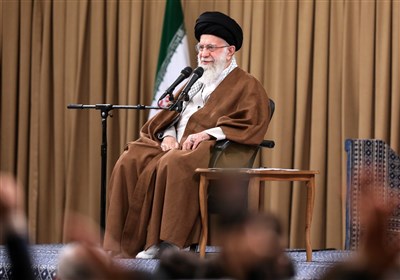‘Kill The Bill’ Protesters Rally across England, Wales
TEHRAN (Tasnim) – Protesters rallied in central London and dozens of other cities in England and Wales against a crime bill that critics say will impose severe restrictions on the right to protest.
There were scuffles between police and protesters in Parliament Square on Saturday afternoon after thousands marched in opposition to the bill from Hyde Park, culminating in over 20 arrests. Protesters had rallied outside parliament to hear speeches against the police, crime, sentencing and courts bill, then blocked the road.
The police, crime, sentencing and courts bill, which passed its second reading in parliament last month, will modify existing public order legislation to make it easier for police to ban or shut down peaceful protests if they are considered too disruptive or likely to lead to disorder.
Opponents of the bill have called it an attack on the right to protest and a step towards authoritarianism. They warn that in conjunction with new laws giving agents of the state license to commit crimes while undercover and changes to the judicial system, the balance of power is being tipped towards the authorities, eroding individual freedoms.
Speaking to the crowd at Parliament Square, Jeremy Corbyn, the former leader of the Labor party, said it was protest that was responsible for the basic rights people enjoy today. He said: “I want to live in a world of peace and justice, I want to live in a world of human rights and democracy, and I’m prepared to make people feel uncomfortable in the process.”
Zarah Sultana, the Labor MP, said: “Power is with us, it’s with you, it’s with all of us … I know that because now I am in the so-called corridors of power, and they are scared of what we can achieve in the streets, they are so scared.”
In Bristol, more than 1,000 people gathered for the fifth kill the Bill demonstration in the city centre in the past two weeks. Avon and Somerset police said that about 500 protesters remained by the cenotaph in Bristol following the end of a peaceful march, The Guardian reported.
Later, police issued a dispersal order to direct people and groups to leave the city centre of Bristol following “a number of incidents involving violence between the remaining protesters”, according to a tweet by Avon and Somerset police. Earlier, the force said it had reopened the M32 motorway after it was closed to inbound traffic at junction 3 when protesters sat on the road.
Elsewhere outside London, protests rallying under the slogan “Kill the bill” were expected in Aberystwyth, Bath, Birmingham, Bournemouth, Brighton, Cambridge, Cardiff, Derby, Exeter, Folkestone, Kendal, Lancaster, Lincoln, Liverpool, Luton, Manchester, Newcastle, Northampton, Norwich, Nottingham, Oxford, Plymouth and Portsmouth.
The latest demonstrations come after police in Bristol were condemned for crackdowns on three protests against the bill last month, with officers in riot gear and dogs sent in to clear the streets three times in the city in the space of a week.
COVID regulations have since been relaxed and protests are now lawful in England and Wales, providing protest organizers make a risk assessment and take steps to limit the potential transmission of coronavirus.
In London, thousands of protesters rallied at Speakers’ Corner from midday onwards before marching down Park Lane, towards Westminster. Marching to the beat of a samba band, crowds chanted: “Kill the bill” and “The UK is not innocent.”
The Labor MP Bell Ribeiro-Addy was among the speakers who addressed the crowd in the park. She said: “The police, crime, sentencing and courts bill should come as no surprise: it's part of an authoritarian drive from this government. We can see it in everything they have been doing recently, from voter ID registration to anti-union laws and now anti-protest laws. They want to strip away our hard-fought, hard-won democratic rights and we must stop them.”
Other speakers included the Labor MPs Apsana Begum, Clive Lewis and Zarah Sultana, and the civil rights campaigners Peter Tatchell and Lee Jasper.
Representatives of All Black Lives, Global Majority, Extinction Rebellion, and the Gypsy, Roma and Traveler communities were also expected to speak.
Among those protesting was one man dressed as the Grim Reaper, who declined to give his name. He said: “I’m here dressed as the Grim Reaper to mourn what is in effect the death of democracy … We need to stop this bill going through because it’s a complete erosion of our civil liberties.”
After most protesters left Parliament Square, police surrounded a small group that remained and started making arrests, before ordering them out of the area. A fast-paced march up Whitehall followed, pausing for a while at Trafalgar Square where more arrests were made, with police moving in in squads to snatch individuals. Several people said they had been pepper-sprayed by officers in the fracas.
Several hundred protesters then marched up the Strand and eventually a large group was trapped by several hundred officers in riot gear at Aldwych. Just before 9pm, police said they had made 26 arrests related to the protest on suspicion of offences including assault on police, breach of the peace and possession of an offensive weapon. Ten officers had been injured, none seriously, the Met said.
Addressing the reasons for the protest in a video posted on Twitter on Friday, Corbyn said: “The right to protest is precious. Protest movements make history, from the eight-hour working day, to the vote for women, to the right for equal pay, the rights we take for granted had to be won through protest. We took them; they weren’t handed to us by the rich and powerful.
“From opposing apartheid to the Iraq war, I’m proud to have protested against injustice and defended the right to itself. That right, which gives a voice to those often unheard, is once again under threat from a dangerous bill which effectively criminalizes peaceful protest.”






